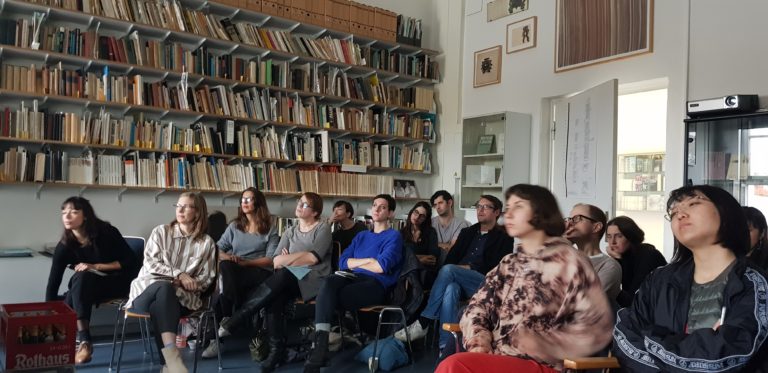*Vilém Flusser, European Media Art Festival Osnabrück, 1988
A round table discussion with Anita Jóri (Vilém Flusser Archive), Graham Kelly, pxFlux and Viktorija Šiaulytė.
We discuss topics regarding digital archives and artistic praxis. As the internet has become an even bigger source of knowledge distribution and application; it has also become a place for artistic investigation and presentation. Following the thoughts of the media philosopher Vilém Flusser, we would like to talk about the potentials and challenges of digital databases for artists with research focused practices. Among over 2500 manuscripts, publications and documents of Flusser’s correspondence, we will look at developments of what he called “the revolution of the technical image” through concepts such as authenticity and originality, private vs. public and the institutional vs. the political and the commercial.
 Vilém Flusser Archive, Berlin University of Art, Photos: Michael Wirths
Vilém Flusser Archive, Berlin University of Art, Photos: Michael Wirths
About the participants:
Dr. Anita Jóri (HU) is the scientific supervisor of the Vilém Flusser Archive since October 2016. She will introduce the moving history of the Archive and guide us through a selection of archival material. Jóri completed her master studies in history, pedagogy and applied linguistics at Eötvös Loránd University (Budapest, HU). Her Ph.D. thesis was dealing with the linguistic questions of the discourse community of electronic dance music.
Graham Kelly (UK/NL) is an artist, writer, and filmmaker. His practice is situated in the interface between contemporary forms of image, the physical body, and the environment. Graham will talk about a hypothetical digital materiality citing examples from his artistic practice. His work poses the question: in an increasingly complex system of networked imagery, where are the formal boundaries (if any) of digital archives and experiences?
pxFlux is an online, open source platform that offers a toolset for the exhibition, promotion, distribution, and collection of time-based, computational digital art. Its co-founders Aleksander Komarov (BY), Maxim Tyminko (BY) and Vladimir Minakov (BY). Aleksander and Maxim will talk about forms of sustainable digital data preservation of data, and the potentials of digital techniques to present artworks in ephemeral and unstable media. Together with Maxim and Aleksander, we will look at both how artists adapt their works for online digital media platforms and how these platforms could adapt to artistic needs.
Viktorija Šiaulytė (LT) will present her project ”Good Life” that she developed together with filmmaker Marta Dauliūtė (SE/LT) during their residency at the Flusser Archive in 2018. It is an ongoing research and documentary film project that merges research, moving image, and curatorial practice. ”Good Life” undertakes an investigation into the narrative of innovation and flexibility and its social and political implications. Through interviews, ongoing discussions and group workshops with a selected group of entrepreneurs of the tech startup scene, Šiaulytė and Dauliūtė map the relation between their own position of struggling to deal with the self-management imperative and those who see it as an ever-growing business opportunity. At the heart of the ”Good Life” project lies the question: how can one share critical analysis with people whose worldview is radically different?
This event was generously supported by the Berlin Senate for Culture and Europe. Photo credits: Michael Wirths .